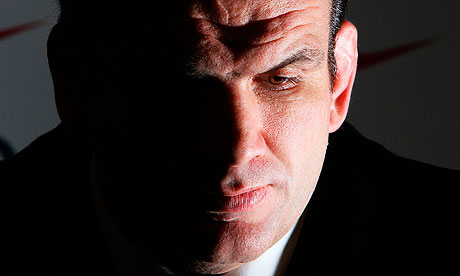
Rewind the past three and a half years, then erase the tape. Remember Martin Johnson the way he deserves to be remembered, as the dark-browed, monosyllabic, iron-clad lock who led England to the finest hour in their rugby history and then retired to watch his small daughter grow up. Not as the man who sat down at Twickenham to announce his departure from a job he should never have been offered in the first place.
There are people you don't mind watching take a bit of pain, usually as a payback for getting above themselves, but Johnson is not one of them. No one reaches the heights he scaled as a player without acquiring a certain confidence in their own abilities, yet neither as captain of England nor as team manager did he display anything you could reasonably describe as arrogance. Impatience with those he considered fools or timewasters, now that was another thing.
His resignation comes as a relief, and probably most of all to the man himself. No observer can have taken pleasure from the managerial tyro's early struggle to find the key to creating a winning side, or from later humiliations inflicted by his ill-disciplined, underperforming players.
In Wednesday's press conference he was unable to provide a coherent reason for declining to seek a new contract, beyond indicating that he was reluctant to commit himself to another four-year World Cup cycle. The only possible conclusion was that he had pre-empted any possible decision by the Twickenham hierarchy because he had simply grown fed up with the whole circus.
"I don't regret taking the job at all," he said. "You get the opportunity and you either take it or you don't. There will be part of me that regrets leaving it in these circumstances, because there's a bit of a feeling of unfinished business and you'd like to put right some of the things that need to be put right."
He would not list the things that needed to be put right or explain in detail why he had decided to leave the business unfinished. He had not, he said, arrived at the decision quickly or easily. "I gave it a huge amount of thought and I think it's in the best interests of myself and the England team that I don't carry on into next year."
There was a strong hint that the decision had been a long time in the making, perhaps formed before the events in New Zealand that will define his career as an international manager. "Even before the World Cup you have thoughts about where you are and what you want to do after it," he said. "It's not a kneejerk reaction. It's a considered and thoughtful decision that I've come to." You can see why he accepted the appointment when it was offered after the badly handled dismissal of Brian Ashton. It was a set-up that, after 82 caps, he knew from the inside. He had worked with several international head coaches, starting with Geoff Cooke in 1992. He had watched the transition from the amateur era to full-blown professionalism and seen coaching teams grow from one man and his mate to a full-blown faculty of specialists in every aspect of the game. He must have thought he could cope.
He would not have underestimated the task of taking England to their third World Cup final in a row, but he would have taken a look at the existing set of assistant coaches – John Wells, Brian Smith, Mike Ford and Dave Alred – and recognised men with whom he felt comfortable. That, in the end, was half the problem.
Several experienced voices, including Graham Henry, had suggested he should stay on, pointing out that Clive Woodward and Henry himself endured disappointment at one World Cup before rebounding to win it at the second time of asking. The difference is that both those men had previously shown a commitment to coaching and had compiled experience at lower levels before accepting the ultimate challenge of international rugby. Johnson had never even coached an under-12 team before taking sole charge of the best-funded squad in world rugby.
Three and a half years later, he still seems unsure of whether it is a role to which he is suited. Having failed to change the England coaching team, he was unable to demonstrate that he possesses any vision of the game other than that of a man who, putting it flippantly, spent his playing career with his head wedged between two other men's backsides. He brought in a group of promising young players but often made strange and uninspired selectorial decisions, not least in his choice of captains, Steve Borthwick and Lewis Moody. He would not say whether he intends to continue in the game.
The other half of the problem was the question of his players' behaviour in their free time. As captain, he wrote in his autobiography eight years ago: "My attitude is very much that guys can do as they please as long as it doesn't impinge on what they do in training and on the pitch." Now he has discovered that something different is required from a manager.
Was he saddened by the way it turned out? "It's not about me and my sadness. Any sadness is about the team not being where you want it to be. There's a group of players there who are people the country can be proud of and who understand their responsibilities about what they are doing in international rugby."
But not all of them. Had the punishment inflicted on Mike Tindall this week tipped him over the edge? "Nothing tips you over the edge. If you let one thing tip you over the edge, you're not making a sound decision. It was my call. I understand that if I hadn't made it, maybe somebody would have made it for me. That's part of it, too."

